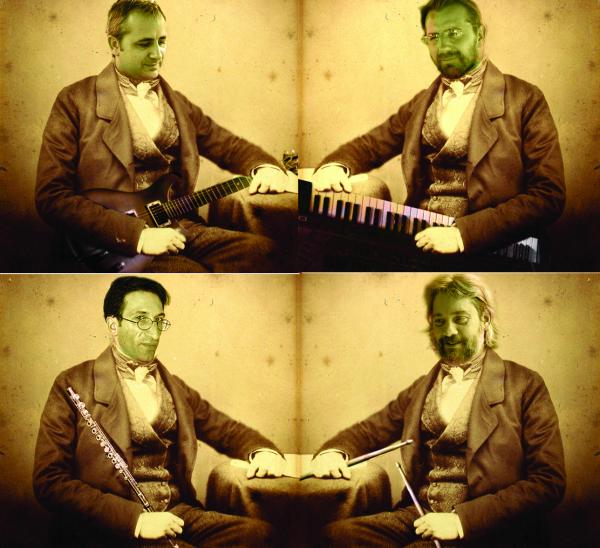|
Interview François and Philippe Claerhout (XII Alfonso) “This project was a real human adventure with highlights and lowlights, laughter and crying, tenderness, happiness and misfortune” (September 2012, text by Henri Strik, edited by Peter Willemsen) Recently I got hold of Charles Darwin (see review), the latest triple album recorded by the French progressive rock band XII Alfonso. After listening to this record it was obvious for me that I wanted to know more about both the album and the band. I realized that Charles Darwin isn't an album that was made in a couple of months. I curiously wanted to know how this album was brought about. Therefore I asked the brothers François (FC) and Philippe Claerhout (PC) to tell me everything there is to know about the album.
Would you please tell our readers a bit about the beginning of the band and why you called yourself XII Alfonso? PC: “XII Alfonso was created in 1988 by François and me and two friends Stephane Merlin and Laurent Sindicq. We started out with simple and funny songs and then changed to instrumental music. We released two self-produced tapes and an EP on CD. Finally we got signed with the Musea Records label in 1996 for our first album The Lost Frontier. The rest is history. The band's name refers to Mike Oldfield's single Don Alfonso (1974). The number XII is rather esoteric, but you have two clues in the booklet of our latest CD Charles Darwin. It has something to do with a car.”Is that car you are referring to a Citroën 2CV? PC: “No, it refers to the Renault 12. There's a picture of that car on the centrefold of the booklet introducing the third CD. On Darwin's office there's also the manufacturer book of that car. In addition you can see Darwin listening to XII Alfonso because the albums The Lost Frontier and Under lie on his desk. He's drinking a bottle of wine called Alfonso. On the wall there's a picture of a dog of a friend of mine called Darwin. Just beside the dog you'll see a Spanish note in pesetas showing King Alfonso XII.” | ||
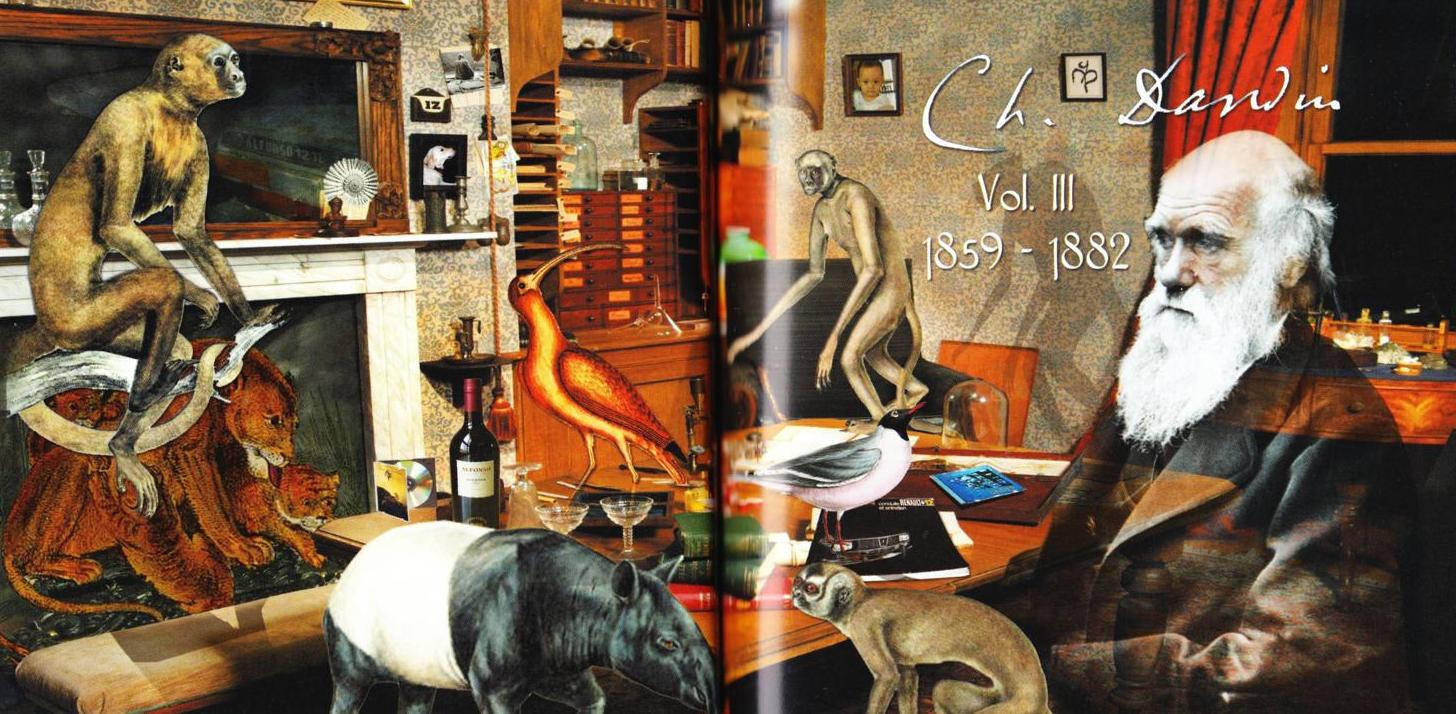
| ||
|
Who came with the idea to write music dedicated to the life and works of Charles Darwin? FC: “We have read the book On The Origin Of Species, the most famous work Darwin wrote in which he explains his evolution theory. We were both afraid to read such a famous scientific book since we're not involved in science at all. But, from the first pages, the language and the formulation is so clear, so logical and so easy to read that it was a pleasure to get into Darwin's way of thinking. At the end of the first reading, we've bought the autobiography as well. After reading less than ten pages, the idea of recording a conceptual album about Darwin was born.”When did you start out to work on this concept and how long did it take before it was realized? FC: “At first Philippe and I didn't think of Charles Darwin to become a triple album. In fact we wanted to write the music separately and then later on show the results to each other and to the other members involved in the project. During the first session of our demo tracks, we discovered that we had more than one hour of music. When we started the project the different tracks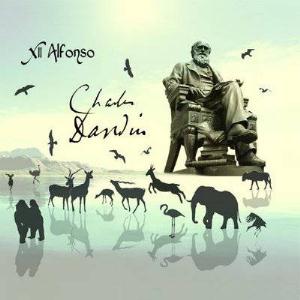 came rather easily. Working for two and a half years on a big project like this
is a relatively short period. Keep in mind that we are no professional
musicians, but full time workers. Phillippe is responsible for the
communication of a big national school and I'm a teacher, also involved in
African projects. Since we've both passed the age of forty we try not to lose
too much time by working as concentrated as possible. When you need too much
time for a project you often lose the pleasure for it. We never lost the pleasure during the making of
Charles Darwin.
Every session was full of creativity, meeting different musicians. Unfortunately,
at the end our close friend Thierry passed away, but we kept him involved in
the project as long as he could. He was given too short a time and he couldn't
hear the final product. During the period of mixing, we had the feeling that
Thierry was around in the studio and we often asked him: 'are the drums clear
enough for you?' Since the day we decided to call it a day, the feeling of his
presence gradually became less. We truly miss him, but the gap cannot be filled.
This project was a real human adventure, with highlights and lowlights, laughter
and crying, happiness and misfortune, yes... a human adventure.”
came rather easily. Working for two and a half years on a big project like this
is a relatively short period. Keep in mind that we are no professional
musicians, but full time workers. Phillippe is responsible for the
communication of a big national school and I'm a teacher, also involved in
African projects. Since we've both passed the age of forty we try not to lose
too much time by working as concentrated as possible. When you need too much
time for a project you often lose the pleasure for it. We never lost the pleasure during the making of
Charles Darwin.
Every session was full of creativity, meeting different musicians. Unfortunately,
at the end our close friend Thierry passed away, but we kept him involved in
the project as long as he could. He was given too short a time and he couldn't
hear the final product. During the period of mixing, we had the feeling that
Thierry was around in the studio and we often asked him: 'are the drums clear
enough for you?' Since the day we decided to call it a day, the feeling of his
presence gradually became less. We truly miss him, but the gap cannot be filled.
This project was a real human adventure, with highlights and lowlights, laughter
and crying, happiness and misfortune, yes... a human adventure.”Did you contact relatives of Charles Darwin for this project or did you have to deal with some legal rights? PC: “No, we didn't contact anybody and no, we didn't have to deal with any legal rights. We just tried to sell this CD at Down House, the former dwelling of Darwin's, but it wasn't successful. It would have meant a lot to us.”You wrote exactly three hours of music recorded on three discs? Was this meant to be this way or just a coincidence? PC: “The writing process advanced slowly. At first my brother and I gave each other some time to write music. We came up with a quite a lot of material. When we started to work on the structure of the record, chapter by chapter just like a book, we needed more and more music to illustrate what we wanted to say and mostly it came rather easily. Only Emma And Charles was very difficult to complete. At first it sounded like Depeche Mode, then it became a prog metal track and finally, after eight or ten different versions, it resulted in the current kind of ballad with a Celtic flavour in the end. It's rather funny to release a demanding triple CD in an era wherein most people don't buy CDs anymore. They now have more difficulty with concentrating because they rather like watching the bullshit on TV! Not that Charles Darwin is a complex album, but three hours of music is rather long to digest! As François already said, it was never meant to be a triple CD. Very quickly, the concept, the music became stronger than us. We were no longer the masters of the project; the music had a fascinating life of its own because of the good vibes until we realized that our friend Thierry wouldn't make it to the end of the project. But even then, we had the moral obligation to finish it and to make everything as perfect as possible in his memory.”Who came with the idea of the beautiful package with a booklet containing 76 coloured pages? FC: “The design of the booklet and the package has changed during the project. At first we had the idea of making a kind of old book-shaped box with two CDs. But when it turned out to be three CDs, we changed our mind to three digipacks. The cover of the digipack is the double page used as an introduction to volume I, II, III. We also had in mind that people could only buy one CD at the time, but later on we realized that it is one concept album. Of course, people are not supposed to listen to it in one session, but just like a book, you listen from one track to another like turning the pages of a book.” | ||
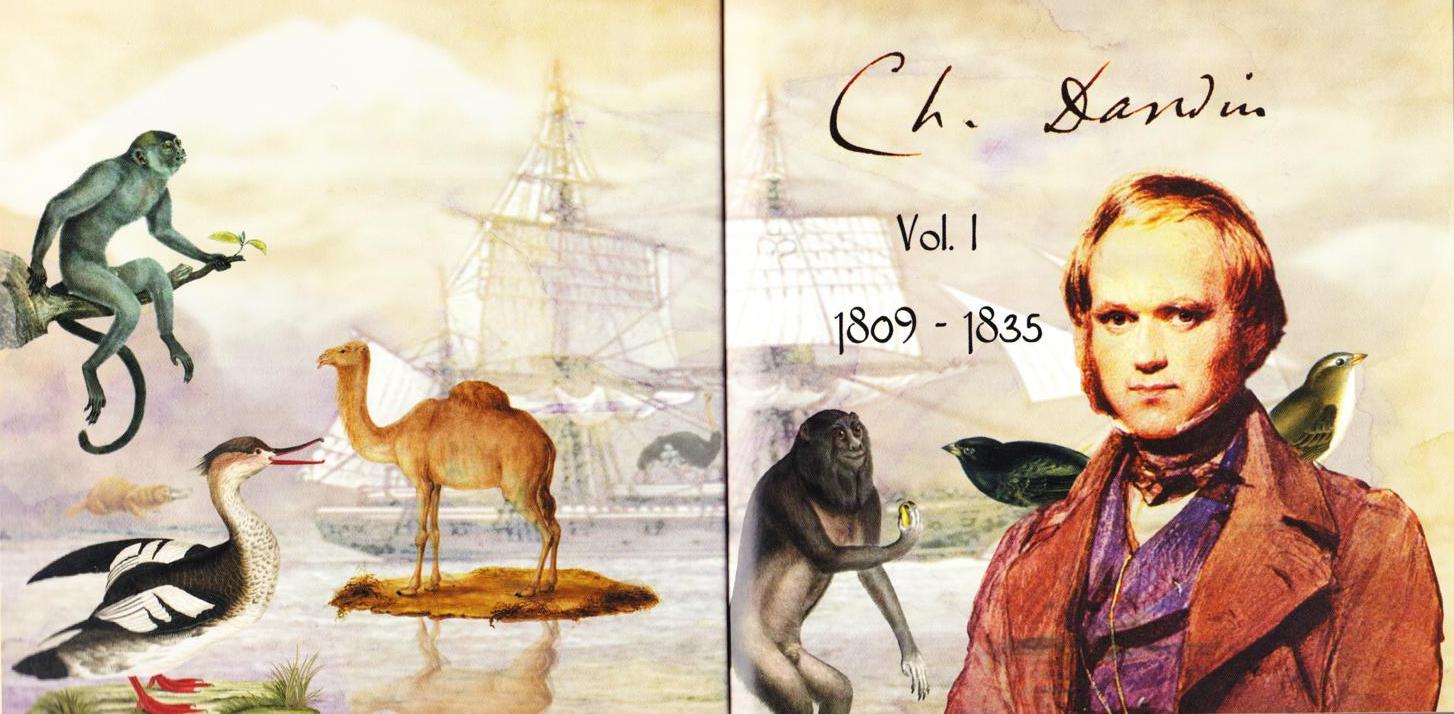
| ||
|
How difficult was it to get everything visualized in the booklet with so many pictures of Darwin's history, the musicians involved and some of the used instruments? FC: “The number of pages is the answer to your question; 76 pages are just enough. Then again, we're no professional musicians, that is to say, we have no education about writing or reading music as the academy of music teaches; we don't think in notes. Mostly literature, books, facts and history form the heart of our research. Music is a way to tell stories without words. Our album is literally a musical biography of Darwin, like the score of a film without pictures. We tried to translate the pictures we had in mind into chords, themes and atmospheres. This makes our music rather visual. The booklet is the framework of Darwin's life and the music is weaving through facts, events and works. We have nostalgic feelings of the time when artists presented their guitars and keyboards in detail. Remember the albums of Steve Howe with his guitar collection. It was just as amazing as his music! We wanted to pull people inside our musical adventure; the most curious listeners are able to distinguish between the instruments and recognize it in the booklet.”Did you intend the story to be told in a chronological order including the major events of Darwin's existence from the beginning? FC: “Yes, but during the creation process some events we left out and some were useful for the comprehension of the story. Especially in music a biography is really hard to follow. We had to be as intelligible as possible, although the tracks were not recorded in the correct chronological order. Inspiration was leading!”What kind of sources did you use to get some background information about Charles Darwin's life and travels? FC: “Mainly books. At first On The Origin Of Species for the main concept. Then we read Darwin's autobiography containing details of his childhood and studies. This was the main part of the first album. Then the Beagle Diary, which was also the inspiration for the first album. We visited Down House and this gave us some ideas for the second album. We've also read extracts from books about coral reefs and Cirripedia's book. The third album was mainly based on the Origin Of Species.”Do you know who Harriet was? FC: “Yes, she was a turtle that Darwin brought back to England from the Galapagos Islands. There's so many to say about Darwin, his life, his curiosity about everything around him, his kindness for his children... but three CDs are enough!”You're right about Harriet! What do you think about the idea that Darwin captured wild animals and was involved in the creation of what we now would call genetic manipulation? FC: “It's always easy to judge someone from the past with the views and the ideas of the present, but that's not fair. Regarding to the nineteenth century, Darwin really was an exception as far as education is concerned; he really was ahead of his time, but still a man of that era. Societies for the protection of animals weren't common in his time. London was lightened by the oil of whales and people of other races were considered to be inferior in the order of creation, as Linné has classified all beings. Darwin's view proved that men were not superior in the living system, only different.”Which part of Charles Darwin's story was the most interesting for you personally? FC: “His endless curiosity. Reading the Beagle Diary, there's nothing that escapes his attention. Until the end, Darwin was interested in everything. He wanted to find explanations about all the living forms he discovers.” | ||
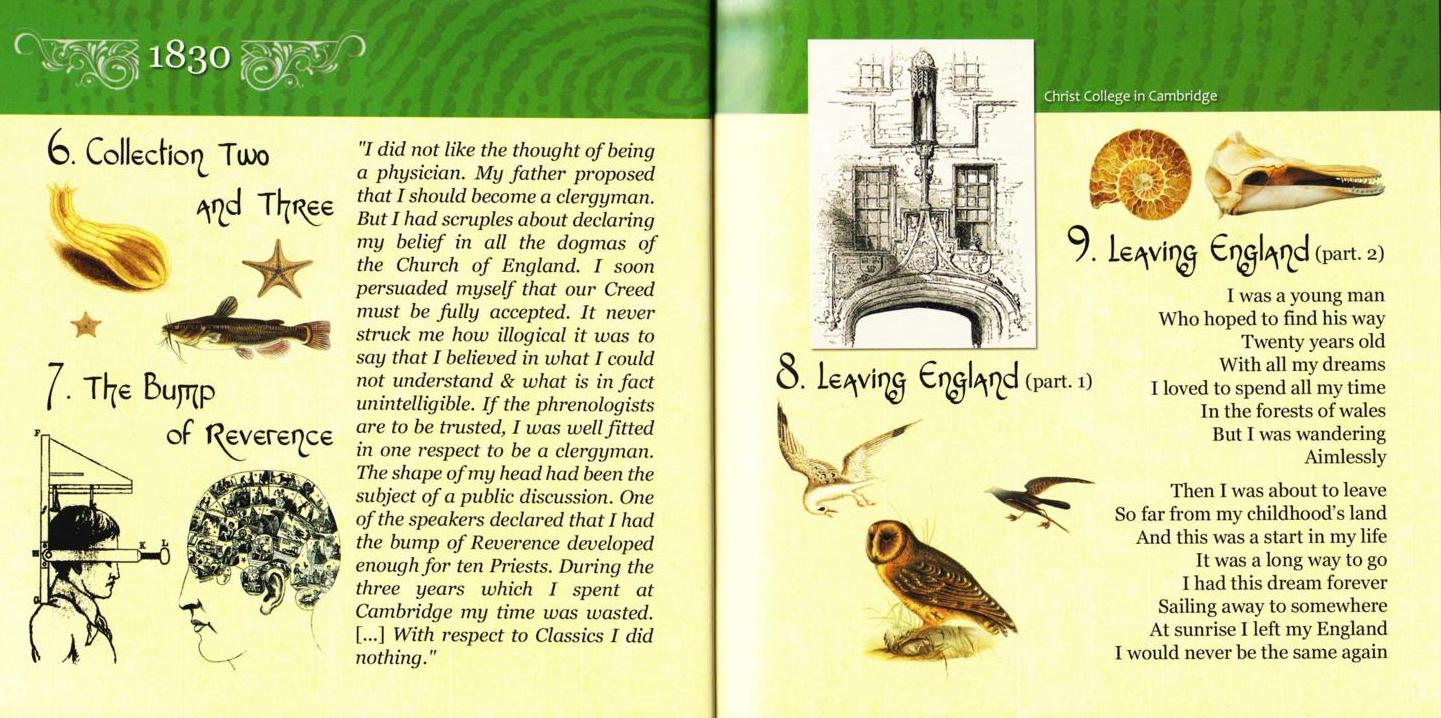
| ||
|
Did you make Charles Darwin's voyage with the Beagle yourself or do you intend to do that one day? FC: “Well, we travel a lot mainly in Africa or Yemen. We went to South America, but never in Darwin's footsteps. Of course, doing again such a fantastic expedition of the past would be really exciting. I would like to do the Dakar Djibouti trip made in 1931 by Marcel Griaule. The journey of The Beagle will remain a dream for we are just ordinary people with a small budget. Maybe in the future if we have sold thousands of records, this dream will become reality, ha, ha!”Why do you think that Darwin's story and his theory of evolution are still interesting today? FC: “Have a look at the Creationist movement in the USA or the increasing of the Islam around the world. They force people not to laugh, not to read, not to play... Darwin's message is just the opposite: open your mind and be ready to change, to learn and to move. Stay open-minded, try to help your neighbour because this human specificity is needed for the struggle for life. Be prepared for the changes on the planet. We're living in an era that a large wave of immigration in Europe occurs and, in terms of biology, this is the best thing that could happen to species! Some parties in Europe are defending the fact that countries must now recover their ancient purity. This is absolutely stupid in terms of evolution. Species or civilisations can never fight against evolution; they must adapt and face the future. Extreme conservative parties have announced the end of our civilization. Some of them are trying to adapt the old Europe to the new deals of the world. This is in fact Darwinism in action; biology against politics, reason against faith, logic against credo. This is Darwin.”Would you please introduce the musicians who were responsible for the compositions and for playing most of the instruments? PC: “That would be a very long list, because fifty musicians were involved in the Darwin project! A nice word can be said to all of them, whether they're professionals or not. François and I composed most of the music; our friends in Argentina sent us a rough version of Tierra Del Fuego and our friend Franck Chaubet composed the track Collection on guitar, a piece that we arranged in different ways throughout the albums. Mickey Simmonds helped us to structure the music, and gave light and life to some of our demos. After his session, we were so confident about the quality of our material that I wanted this album to become a 'dream come true': why not ask all musicians we admire to join? And a lot did! Flautists John Hackett and Terry Oldfield both did a great job. Tim Renwick gave us advices about some tracks and he played wonderfully guitar. The talented John Helliwell was so kind as to play on all tracks instead of the two he promised initially! The vocalists were great too. Jayney Klimek and Alister Gordon sang for the first time together since Tony Banks asked them for the Bankstatement album in 1989.”Was it difficult to associate with the fact that Thierry Moreno passed away during the realization of the album? FC, PC: “Thierry was the drummer and our friend for almost twenty years. One year before he passed away, we met a sound engineer who listened to the demos. He was so excited with our triple album project that he offered Thierry to do the drum sessions in his studio. Charles Darwin is our first album on which the drums are really played. At the end of July 2010, Thierry suddenly collapsed; for 45 minutes he was in a coma at the hospital. Later on they found out he had a small tumour. Afterwards he played in just ten hours 22 tracks in the studio. All the other instruments were already recorded. Imagine what a great and almost impossible job he did! He did it like being in a trance. Twelve months later, he died of cancer. He came to my house every two or three days during ten months to work on the mixing. One day he phoned − I clearly remember the moment. I was anxious because he was late. He told me that he wasn't able to get up. That day was close to his end. Phil and I worked for five months in a row after he died, and all the time we had the feeling that Thierry was with us. Many times I turned to his chair to ask him: “How do you find the mix?” Now the album has been finished, he left the studio and sadness came instead.” | ||
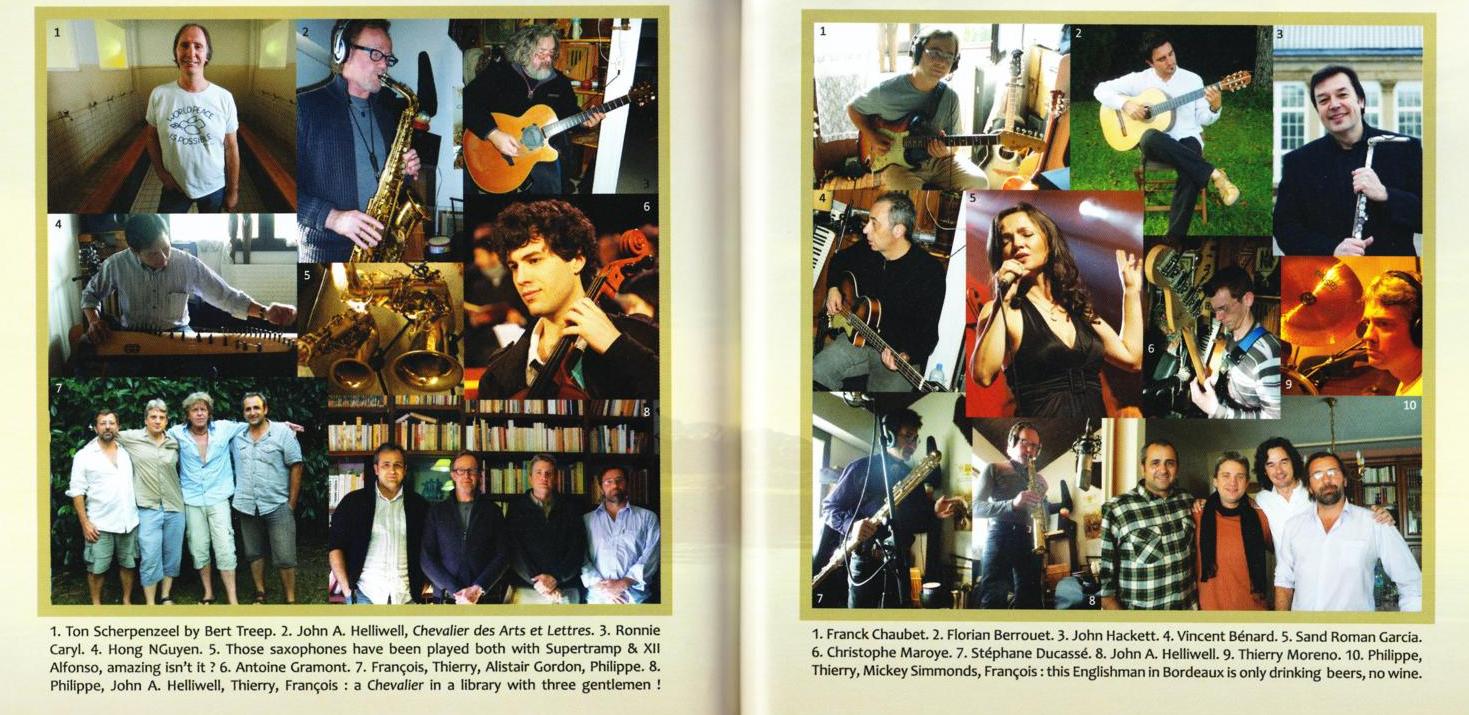
| ||
|
How difficult was it to get John Helliwell, Supertramp's legendary saxophonist, flautist John Hackett, Francis Dunnery, the former guitarist of It Bites, bassist Michael Manring and the keyboard players Mickey Simmonds and Ton Scherpenzeel to perform on the album? PC: “In fact it wasn't difficult at all. I wrote an e-mail to John Helliwell and he asked me to send some demos. After sending them he said that he loved the music and could probably add something interesting. When he came, he was about to join Supertramp for a world tour. We asked him why he came all the way to Bordeaux to play with an obscure and totally unknown band. He answered that he had more reasons to come than to stay away and that's why he came. We really had a good time with him. John Hackett was pleased with the demo, and we did the sessions on the internet. Francis Dunnery came to my house some years ago for a home concert, and when I asked him to play on the record he immediately agreed. A friend of ours knows Michael Manring very well, so that was easy too. Mickey is a long-time friend, and I think he knows that if he had said 'no', I would have constantly asked him until he said 'yes', so he agreed immediately. Ton Scherpenzeel recorded his part in his home studio. We sent him 48 different chords series, asking him to play a solo on it, which is rather crazy. He returned not one, but two series with a very long and inspired solo; the double of what we had initially asked for.”Did you also ask musicians that could or would not appear on this record? PC: “Yes of course, some of them didn't answer. People like David Gilmour and Sting. From other musicians we got nice and encouraging words like Jeff Beck, Brian May, Nick Van Edde, Bruce Hornsby, Peter Gabriel and Trey Gunn, just to name a few. Some gave us blurred answers because they think they're the most important people in the world. We asked the former bassist of King Crimson, who's now back with his band from the eighties. He asked 30.000 dollars, 500 promo copies and the right to decide who else may play on the record! And only because we asked him to play bass on one track, ha, ha!”Why are some tracks sung in different languages? FC: “Because the musicians hail from different cultures: French, Vietnamese, English and so on. That gives a touch of universality to our project and that fits well with Darwin. Another point is that artists were free of their interpretation. If they didn't feel well with the music or the style or if they wished to play or sing it in their own language, it was okay with us. We were just suggesting; the guest musicians were proposing...”Who came with the idea to use ethnic instruments to tell the various parts of Darwin's story in different continents? FC: “It was evident! We travel a lot and anytime we come home from abroad, we try to bring some strange instruments or possible instruments with us. It's really fun to pretend that you're a dolphinophone or pithecophone player, isn't it? Anyway, all those ethnic instruments are played on stage when we perform for the Song Of The Stones project. It's a complete one hour and a half improvisation, playing stones, flutes, percussion, synths and so on. To improve the feeling of playing 'prehistoric' music with instruments that could have been played in those ages. Synths are a good example! This show is performed in museums specialized in prehistory or during events around prehistory. And the result is quite good!”Did you always want to integrate different styles of music like world music, folk or progressive rock for the soundtrack of this release? PC: “No, we really had no idea of how the tracks would sound in the end. We just composed, recorded, mixed, and here it is. We never said okay let's do some folk here and a metal riff there. Hey, it's only music in the end, ha, ha!”While listening to the music for this project I discovered that a musician like Mike Oldfield must have been influential. Do you agree and if you do, was that the reason to ask Maggie Reilly, who used to sing on Oldfield's albums? PC: “Yes, we have to admit that Mike Oldfield is a huge influence. We really love his music. It's an honour to have played with musicians who have accompanied him over the years like Maggie Riley, Mickey Simmonds, Tim Renwick, his brother Terry and saxophonist Raphael Ravenscroft.” | ||
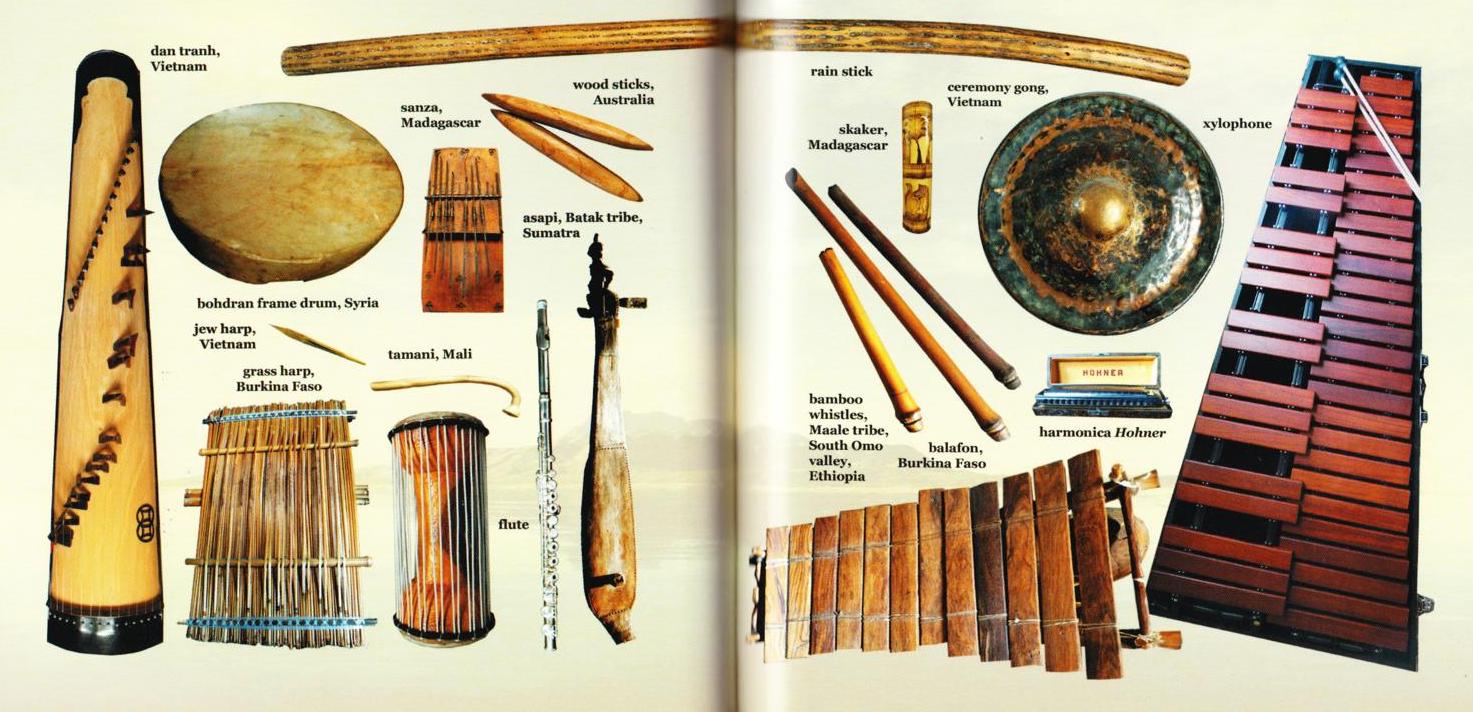
| ||
| One out of 3 instrument pages | ||
|
Are there any other influential musicians while composing and recording the music for Charles Darwin? FC: “Another main influence is François de Roubaix, a composer of movie soundtracks in the sixties and seventies, his music is really melodic.”PC: “And not to forget Pekka Pohjola, a bassist from Finland, but also Dire Straits, Genesis, Yes, Porcupine Tree, BJH, Pink Floyd, Jack Savoretti and many more.” Do you think that XII Alfonso recorded the story of Charles Darwin the best possible way or could it still have been done better? FC: “A recording is a moment in time. We recorded the album the best we could in 2012. It's impossible to do it again, because Thierry has gone. Everything could neither better nor worse. The album is what it is; we're proud that we have succeeded in finishing this project. It's a beautiful product and it also sounds quite well. Charles Darwin is the reflection of XII Alfonso's soul from 2010 until now. The next album will show our progression or regression, who knows... art is not predictable!”Well I have to compliment you both with this CD. Personally I believe Charles Darwin is the best album of XII Alfonso so far. Do you agree? FC & PC: “We do. To work with great musicians is very inspirational!”Is there any chance that someday you're going to perform the music of this triple album on a live stage? FC: “We would like to do that, but it will cost a lot of money to rehearse. Our music is not that easy to play; the structures are rather complex to memorize, so it would take many efforts to perform Charles Darwin live on stage. One concert in Bordeaux wouldn't be enough to start such an extensive work with all the musicians. We need some dates in France and in other European countries. A big festival could be interesting, but in France most of the festivals have stopped. To rent a concert hall is expensive and there are not many organizations who still dare to organize a festival. In fact we need a big record company to promote Charles Darwin on stage. We'll see; who knows...”What's next? Can you record an even better album after this one? FC: “We have Monet III which is almost composed. We have to record it, but our friend Michael Geyre has no time for us at the moment. He lives from making music which makes him a slave of music. He has to accept almost everything in order to have something to eat. We also started to work on another big project: astronomers from Mesopotamia to Newton, passing by Egypt, Greece, Copernic, Galileo, Brahe, Kepler and so on; a history of the cosmogony in music. What a program..!”
Thank you for answering my questions and good luck in the future! “Thank you Henri for your interest in our work and for your patience. Keep up the good work. And 'hallo' to everyone who reads this interview.”More info about XII Alfonso on the Internet: XII Alfonso Website MySpace review album 'Charles Darwin' (2012) review album 'Under' (2009) |
